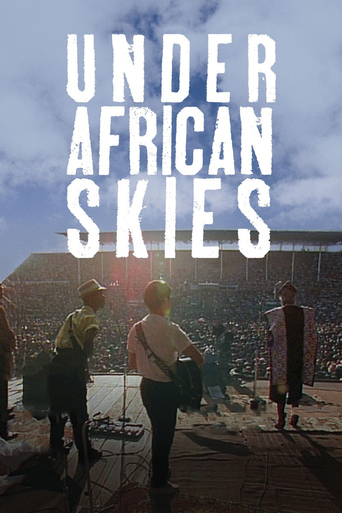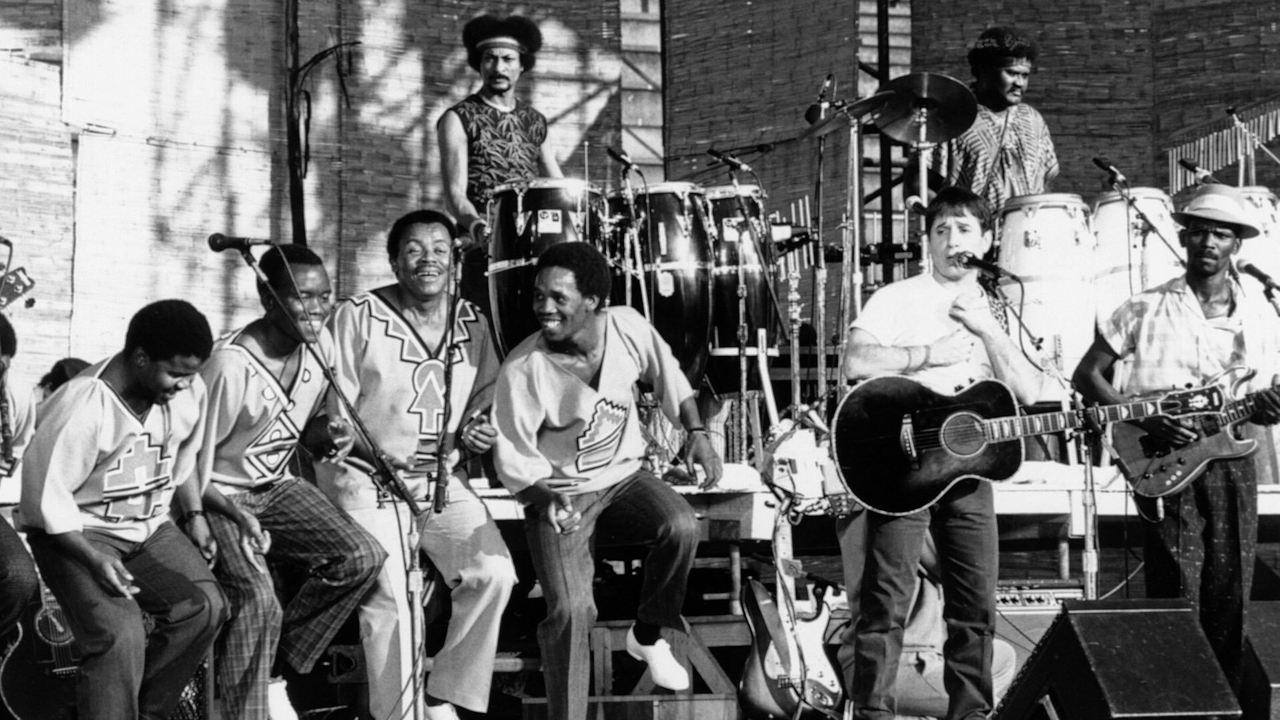bbbaldie
I was amazed to learn how Graceland came about. Turns out many of the songs were instrumentals from the African groups involved which Paul tweaked a bit and then later added lyrics to. What a great tale of creation and cooperation! Paul was vilified by a few for breaking the boycott against South Africa, despite the fact that he performed with exiled artists and also shared with the world some very talented black artists who certainly weren't supporting obnoxious government policies. The angry ones are nowadays pretty much over it, as depicted in the film.What keeps this from being a 10 is the useless addition of Oprah Winfrey and Whoopi Goldeberg. They had nothing to do with Simon's actions, and their opinions matter as much as mine, in other words, not at all. Whoopi, shouldn't you be out pleading the case for Roman Polanski or something? Off to listen to Graceland now...
Howard Schumann
Coming after the failure of singer/songwriter Paul Simon's solo album Hearts and Bones, and the messy breakup with Art Garfunkel, his 1986 album Graceland was the most successful of his career and, to many, the artistic highlight. Simon's return to South Africa to commemorate the 25th anniversary of Graceland is documented in Joe Berlinger's exuberant Under African Skies. The film includes original footage of rehearsals and performances from past and present including an emotionally-charged appearance on Saturday Night Live, interviews with prominent musicians and political leaders, as well as disturbing images of police brutality during the period of Apartheid.It is a fascinating documentary that is not just a standard puff piece but one that deals with the complex relationship between art and politics. Berlinger records the playful give and take of the recording sessions and how the songs developed in Simon's mind from the influence of African bands such as Stimela and the acapella singing of Ladysmith Black Mombazo. Extensive footage from the original recording sessions is interspersed with actual performances both from 1986 and the present day (the latter a pale imitation of the original). Though the reunion is a celebration of friendship and even love (Joseph Shambala of Ladysmith Black Mombazo says that Simon was "the first white musician that he ever hugged"), the film does not duck controversy.The issue is the antagonism of anti-Apartheid activists stemming from Simon's 1985 South Africa trip to recruit black musicians that broke the United Nations cultural boycott. There is a lot of discussion in Under African Skies, perhaps more than music, but it is relevant to the important issues the film raises. Berlinger sets up an exchange between Simon and Dali Tambo, a member of the Artists Against Apartheid that allows each side to present their case without rancor or bitterness. Both present convincing arguments and the director wisely does not attempt to skew the debate towards one side, though it is seems fairly easy to guess where his feelings lie.Weighing in on the issue are prominent personalities such as Harry Belafonte, Hugh Masekela, Miriam Makeba, Oprah Winfrey, Whoopi Goldberg, David Byrne, Philip Glass, Quincy Jones, Paul McCartney, and others. While Graceland may not have directly contributed to the end of Apartheid, Simon contends that the music they produced was an instrument of healing that ultimately was more powerful and of greater political benefit than the boycott. Helping to introduce South African music to the world, he says, demonstrated that another way was possible in South Africa and that the real story was the impact that the project had on the Black musicians and their comments in the film expressing humility and gratitude for the opportunity they were given are the emotional high point of the film.Referring to the African National Congress (ANC), Simon asserts that the artist should not be dictated to by politicians no matter what their cause, and if the ANC wanted to control what he sang and who he sang with, they would be no different than the government they were fighting to overthrow. Isolated and oppressed in their home country, when the ANC ordered the musicians home from their world tour, the guitarist Ray Phiri, told the ANC leadership, "I am a victim of apartheid. It is not possible to victimize the victim twice!" Tambo, on the other hand, counters by saying that Simon's "appropriating" and using Black South African musicians for his own ends is exploitation and, in the context of the UN cultural boycott, endangered the efforts to end Apartheid.Though obviously staged for dramatic effect, the back and forth argument between Simon and Tambo is conducted with restraint and respect and each point of view is given a full hearing. With the 1992 release of Nelson Mandela that signaled the end of Apartheid and the coming to power of the ANC, the controversy has faded but Simon's breakthrough album remains an exhilarating artistic achievement that has lost none of its power after twenty five years, and joyous songs such as You Can Call Me Al, Diamonds on the Soles of Her Shoes, The Boy in the Bubble, and Graceland still have the power to move.Under African Skies is a must see not only for music fans, but for anyone who does not rule out the possibility of being inspired. Though the debate about the relationship between art and politics is not resolved and may never be, the words and the pulsating music of Paul Simon's song Under African Skies performed with Miriam Makeba at a concert in Zimbabwe delivers a message that is loud and clear, "This is the story," the song says. "of how we begin to remember; this is the powerful pulsing of love in the vein; after the dream of falling and calling your name out; these are the roots of rhythm and the roots of rhythm remain."
runamokprods
This documentary celebrates the 25th anniversary of Paul Simon's great Graceland' album. At the same time it questions Simon's political choices in going to South Africa to record during the U.N. approved cultural boycott, seeking to keep South Africa isolated and thus put more pressure on the white regime to step down. Simon's reply is that artists shouldn't be subject to arbitrary political decisions - they must follow their heart and muse first, and he did more to help raise awareness of South Africa by going than by staying away. The film doesn't take clear sides on these questions and that's fine, a documentary doesn't have to take sides on such a morally complex issue to be successful. But there is something a bit slippery in Simon's somewhat pat answers that seem to be given a pass. And a meeting between Simon and Dali Tambo, the South African head of Artists Against Apartheid' feels awkward and staged, each man explaining to the other their point of view on what happened, ending with what felt like a very forced forgiveness hug. Is the film letting Simon off too easily? Or is his very awkwardness Berlinger's point? (even his embraces of the musicians who played with him on the album feel like they might not have happened is there wasn't a camera rolling) . One telling detail, the fact that Simon took first credit on all the music, even though – as we hear some of the original pre-Simon instrumentals from the album – we realize that many of the songs are almost identical, just somewhat re-arranged by Simon. Taking first writing credit seems like an act of hubris that the film never mentions or questions.
lucia-thie
Under African Skies rises above the standard music documentary to celebrate an iconic artist and/or album. In this case, it is set against the controversy about working with South African artists in a time when there was a UN cultural boycott against South Africa. What is shown in this documentary is how the iconic Graceland album (released in 1986) came about and most importantly: how the tracks were created. Defying and defending the free spirit of an artist, Paul Simon, who is above all a musician and not a politician, brought his fascination and respect for South African talented musicians (Ray Phiri, Ladysmith Black Mambazo) to the world via this album. Old footage is interspersed with newly shot material of Paul Simon's visit, 25 years since he first set foot in South Africa, and playing again with these same musicians. Warning: it is not possible to view this documentary without humming, singing and dancing along with the songs : )


 AD
AD




